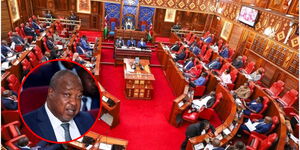National Treasury Cabinet Secretary John Mbadi has defended the strength of the shilling, which has stabilised at Ksh129 to the dollar despite economic uncertainty.
Speaking on Monday during the launch of the FY 2026/27 and the Medium-Term Budget Preparation Process, Mbadi claimed that although there had been a lot of panic in early 2024 over the plummeting economy, the government had put in measures that have stabilised the shilling for over a year.
Among the issues causing this, Mbadi said, was the likelihood of defaulting on meeting the debt obligations, including a $2 billion (about Ksh258 billion in the current exchange rates) Eurobond coming to maturity by June, as the government did not have a repayment plan yet.
"There was a panic last year, the shilling lost ground and rose to close to Ksh165 to the dollar but because of what the government did then and what we have continued to do, in terms of managing our liability and out debt, the shilling appreciated, now to around Ksh129.2 to the dollar and has stayed around Ksh128 to Ksh130 for over one year," he stated.
"I hear some people asking if this is real. The reality is it is real. If you want to believe it is real, look at the forex reserves. The shilling would lose ground when there is a threat to the reserves we have in the country, and our reserves are at 5.2 months of import cover up from 3.8 a year ago."
In addition to the reserves, he also attributed the shilling's stability to the growth in exports in the past year, especially in coffee and horticulture.
He claimed that the exports grew at 7.7 per cent, a growth he said has narrowed the current account balance from 2.6 per cent of GDP to the current 1.3 per cent.
Mbadi also highlighted the diaspora remittances and the government's ability to foresee that there would be a eurobond loan maturing in May 2027, eliminating the risk of a similar panic as the one in 2024.
In fact, he claimed that the latter had been so effective that other countries were looking to borrow a book from Kenya.
"We were very timely, in fact, most countries are wondering how we foresaw the same. The moment we went to the market and managed our 2027 liability, the markets closed. If we had delayed even for a month, we wouldn't have succeeded," Mbadi said.
Mbadi's assertions come just days after the Central Bank of Kenya Governor Kamau highlighted most of the similar reasons, adding that the bank had conducted a market perception survey regarding the exchange rate projections.
As per the survey results, he relayed that most respondents expected the shilling to strengthen further.












